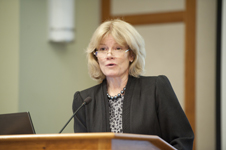
Terry Fulmer, dean of the Bouvé College of Health Sciences, spoke earlier this month at a conference on supporting children in military families. Photo by Mary Knox Merrill.
It may be easy for Michelle Beauchesne to diagnose strep throat, but it’s much more challenging for the associate professor of nursing in the Bouvé College of Health Sciences to identify mental health problems in children whose mom or dad serves in the military.
“We need to figure out what’s going on in the child’s life in school, in the community and within her family,” Beauchesne told more than 100 school nurses, counselors and administers in the Curry Student Center Ballroom on Nov. 2 for a conference on supporting children in military families. “Characteristics of children are dependent in part on their culture, their families and their social circumstances.”
The conference — “Supporting the Home Front: Schools Supporting Military Connected Children” — was cosponsored by Home Base (a joint program of the Red Sox Foundation and Massachusetts General Hospital), the School Health Unit within the Massachusetts Department of Public Health and the Northeastern University School Health Institute in the College of Professional Studies.
Terry Fulmer, dean of the Bouvé College of Health Sciences, praised the large group of health-care professionals for caring for children in military families. “You are the heroes of this enterprise because you are with these children and their families every day,” she said. “What you do is so essential.”
More than 13,000 military-connected children live in Massachusetts. Health-care professionals must monitor their growth and development on an ongoing basis, Beauchesne said.
School bullying, depression and family dysfunction are clear warning signs that a child may be in need of psychiatric care. “Give kids an opportunity to share what’s worrying them,” Beauchesne explained. “Pay attention to concerned parents, teachers and family members,” she added.
But Beauchesne encouraged health-care professionals to downplay slightly unusual behavior. “All kids are normal unless proven otherwise,” she said. “They act differently to the same variable at different stages in their lives.”
Assistant professor of nursing Ann Polcari also addressed the audience.
She said children in military families who don’t participate in afterschool activities run the risk of responding poorly to stress. “Acute stress may trigger symptoms of anxiety or depression or post-traumatic-stress disorder,” Polcari explained.
A child’s happiness is directly related her parent’s well being, she said. “If the parent is doing well, then the child would be doing better because he or she has a place to go and a responsive person to help.”
For more information, please contact Jason Kornwitz at 617-373-5729 or at [email protected].
Northeastern University’s College of Professional Studies (CPS) is committed to providing career-focused educational programs that are designed to accommodate the complex lives of motivated learners. Offered in a variety of innovative formats, CPS courses are taught by accomplished scholars and practitioners who have real-world experience. The result is an educational experience founded on proven scholarship, strengthened with practical application, and sustained by academic excellence.
Northeastern University is a global university with a tradition of partnership and engagement that creates an innovative, distinctive approach to education and research. Northeastern integrates classroom studies with experiential learning opportunities in 70 countries, and pursues use-inspired research with a focus on global challenges in health, security, and sustainability.